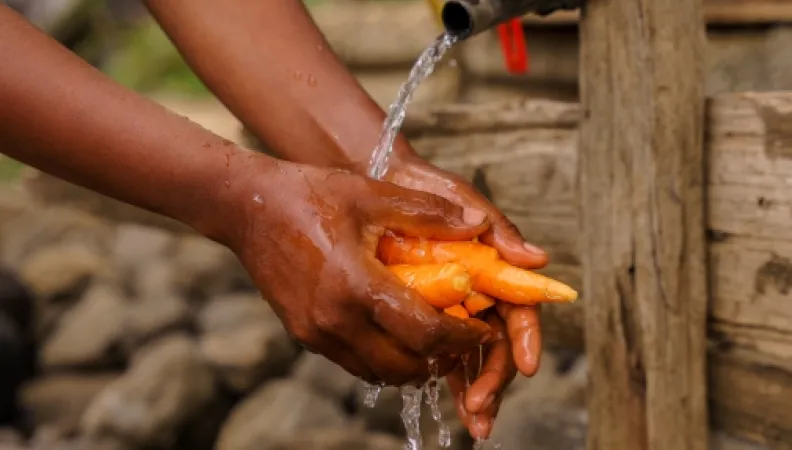Share the page
Nutrition at the heart of sustainable development issues
Published on

From 26 to 28 March, alongside the Nutrition for Growth Summit, a Solutions Village opened its doors in the Parc André Citroën in the 15th district of Paris. It was a place for experts, innovators and engaged citizens to share concrete solutions to address the challenges of nutrition around the world. As it was organised by Expertise France, we take a look at these issues at the crossroads of SDGs 2 and 3 on food and health.
While, according to WHO, poor nutrition causes half of the deaths of children around the world, and 390 million adults are underweight, with 2.5 billion overweight, combating malnutrition is a way of breaking the cycle of maldevelopment.
Indeed, malnutrition has an irreversible effect on the health and overall development of those affected. It also generates cycles of intergenerational poverty for the population groups concerned.
Good nutrition for all is essential to the human and societal development of our countries. It constitutes the firmest foundation for preventing, mitigating and tackling the multiple and recurrent shocks the world is currently facing.
By investing in nutrition, Expertise France and AFD Group contribute to supporting civil society and their partners in the fields of health, universal health coverage, food systems, climate change, and gender equality.
Helping partner countries consolidate their policies to support decent nutrition
Nutrition security requires multi-sectoral interventions and a profound transformation of production and consumption patterns.
AFD Group deploys a comprehensive and critical strategy that mobilises its expertise in agriculture, health, social protection, water, sanitation, and education. This systemic approach integrates gender dynamics, recognising the crucial role that women play in the fight against malnutrition. This action aims to promote equal access to resources for women and their active participation in decision-making. These are essential conditions for sustainable nutrition security.
In addition, creating an enabling environment for nutrition security, through governance, multi-sectoral coordination, advocacy, and an integrated approach to nutrition in sectoral policies, enhances the effectiveness of these nutrition programmes.
A final aspect involves promoting quality standards for food products and monitoring this quality, and introducing tax mechanisms for harmful products to limit their consumption, thereby tackling bad eating habits.
Since 2023, Expertise France has been implementing the EU4SUN programme, in collaboration with FIAP. This 4-year programme is assisting some 30 countries in Africa, Latin America and the Caribbean with the implementation of the SUN Movement Strategy 3.0 (Scaling Up Nutrition – United Nations).
Through this project financed by the European Union, the agency is contributing to making a lasting improvement to nutrition through its support aligned with the priorities defined by each country. This project is implementing activities to strengthen national capacities, improve normative frameworks, and promote advocacy. It is also creating multi-stakeholder spaces for dialogue at the national and regional levels to stimulate debate on nutrition policies.
EU4SUN has two lines of action: it gives priority to the leadership of member countries and their national priorities to initiate systemic changes, and it implements regional initiatives to promote cooperation and experience sharing between countries.
Through its agile and flexible approach, the project defines and adjusts its activities over time to meet the specific needs of its partner countries and the SUN Movement, while adapting to any changes. This inclusive model mobilises all the stakeholders, including governments, civil society, young people, international partners and the private sector, to develop sustainable solutions geared to the challenges of nutrition. For example, the project has already conducted an assessment of the cost of malnutrition in Senegal, strengthened the advocacy of a youth network in Côte d’Ivoire, evaluated Togo’s Strategic Nutrition Plan, and developed an information portal on nutrition in Guinea.
In Haiti, the Multi-sectoral Food Security and Nutrition Programme (PMSANII), financed by the EU and AFD, aims to strengthen the food and nutrition security of the population of Haiti, with a focus on the departments of Haut-Artibonite, Nord-Ouest, and Nord-Est. Through a multi-sectoral and integrated approach, it combines the development of sustainable food production, improved access to a healthy diet, and the promotion of appropriate nutritional practices, with a strong focus on outreach to the most vulnerable population groups.
The implementation of this project includes financial support to two French NGOs, Initiative Développement (ID) and GRET. Their expertise is helping to:
- Strengthen food security, by supporting sustainable agriculture and disseminating agroecological practices to ensure stable and diversified food production;
- Develop local capacity for the identification and treatment of malnutrition, by training community actors and supporting health facilities, with a focus on pregnant women, young children, and poor families;
- Raise awareness among communities of the importance of a balanced diet, and help them develop income-generating activities.
Sustainable, innovative and resilient agriculture: an essential condition for food security
To tackle malnutrition, it is essential to strengthen national and local agricultural systems, because they provide incomes and empower rural communities.
Expertise France contributes to the development of sustainable agriculture, simultaneously addressing issues related to the climate and the sound management of rural areas and natural resources. In this way, it helps develop more competitive and climate-resilient agricultural value chains, which in turn contribute to strengthening rural dynamics that create jobs and generate wealth.
Expertise France operates in a range of sectors that drive innovation. It focuses its action on increasing agricultural and fisheries production, fair for communities, especially in areas affected by economic and social crises. This is the case in Yemen, through the Fish2Dev project to support the fisheries sector, which addresses local nutrition issues and post-crisis recovery.
Indeed, to reduce the prevalence of malnutrition, it is necessary to address all the determinants of food security. This includes the challenges of digital technologies, sustainable development, and the management of risks and major crises.
Improving the balance between respect for the environment and nutrition
In the Comoros, the Blue and Green Deal – “Comoros Ulanga ne Maesha” (Environment for Life) focuses on activities that promote national food systems essentially based on modes of production, marketing and consumption that are more sustainable, diversified, healthy and climate-resilient, in the agriculture, forestry and fisheries sectors.
In doing so, the programme is aligned with the national priorities of the Comoros Emerging Plan, which covers all the aspects of food security for nutrition, and the conservation of island ecosystems and marine protected areas.
In West Africa, the GCCA+ programme has financed pilot projects for climate change adaptation in the sector of rural development and resilient agriculture, while Gulf of Guinea countries are severely affected by the effects of climate change and population growth, for example, Côte d’Ivoire, Mauritania and Togo.
Integrating the digital dimension in the fight against malnutrition
The use of digital technologies is a major source of progress. They can today improve the management of natural resources and crops, which has benefits for agricultural production systems, especially in Africa.
In partnership with the Food and Agriculture Organization of the United Nations, the Pan African Statistics programme aims to produce and disseminate statistical data on agriculture, climate change and the environment in 55 African Union countries.
Beyond this institutional commitment, certain regional projects, such as D4D Hub and Geospatial, aim to provide data collected by satellites from Europe’s Copernicus programme, which are analysed using artificial intelligence. With this data, it is possible to optimise the use of chemical inputs, by assessing the actual needs for crops, and thereby limit inputs and the associated greenhouse gas emissions. These data also contribute to increasing crop yields by facilitating precision agriculture, and help optimise crop monitoring. This optimises the management of irrigated land and livestock, which improves the productivity of production systems and thereby strengthens food security.
To find out more
On the same topic
Agriculture | “We’ve targeted family farming because it’s everywhere and it’s essential”
The demographic and climate challenges call for the development and strengthening of agricultural value chains by supporting the various stakeholders in the sector. Expertise France contributes to the...
Published on February 28, 2024

